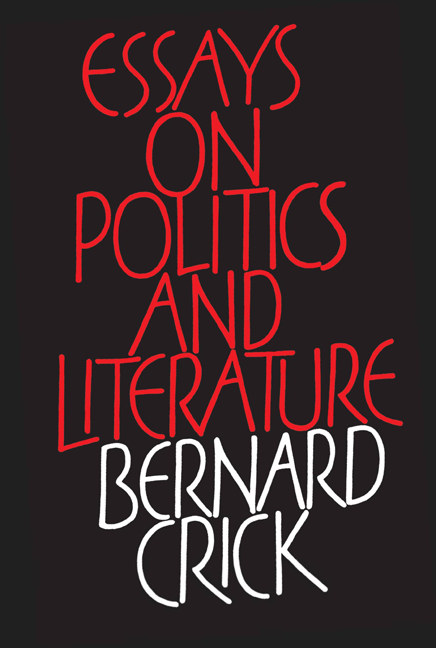Book contents
- Frontmatter
- Contents
- Preface
- Acknowledgements
- Foreword by David Daiches
- One Literature and Politics
- Two The Political in Britain’s Two National Theatres
- Three Young Writers of the Thirties
- Four Koestler’s Koestler
- Five Hannah Arendt: Hedgehog or Fox?
- Six Beatrice Webb as English Diarist
- Seven Words
- Eight My Lse
- Nine Reading The Observer as a Complex Text
- Ten On the Difficulties of Writing Biography and of Orwell’s in Particular
- Eleven Reading Nineteen Eighty-Four As Satire
- Twelve Animal Farm For Schools
- Thirteen Orwell and English Socialism
- Fourteen On the Orwell Trail
- Fifteen Wedekind’s Spring Awakening
- Sixteen Horvath’s Tales From the Vienna Woods
- Seventeen Pinter’s No Man's Land
- Eighteen Polly By Gaslight
- Nineteen Edgar Catches Jenkins’ Ear at the Barbican
- Twenty Barrault at the Barbican
- Index
Thirteen - Orwell and English Socialism
Published online by Cambridge University Press: 24 September 2020
- Frontmatter
- Contents
- Preface
- Acknowledgements
- Foreword by David Daiches
- One Literature and Politics
- Two The Political in Britain’s Two National Theatres
- Three Young Writers of the Thirties
- Four Koestler’s Koestler
- Five Hannah Arendt: Hedgehog or Fox?
- Six Beatrice Webb as English Diarist
- Seven Words
- Eight My Lse
- Nine Reading The Observer as a Complex Text
- Ten On the Difficulties of Writing Biography and of Orwell’s in Particular
- Eleven Reading Nineteen Eighty-Four As Satire
- Twelve Animal Farm For Schools
- Thirteen Orwell and English Socialism
- Fourteen On the Orwell Trail
- Fifteen Wedekind’s Spring Awakening
- Sixteen Horvath’s Tales From the Vienna Woods
- Seventeen Pinter’s No Man's Land
- Eighteen Polly By Gaslight
- Nineteen Edgar Catches Jenkins’ Ear at the Barbican
- Twenty Barrault at the Barbican
- Index
Summary
In 1946 in the essay ‘Why I Write’ Orwell wrote: ‘What I have most wanted to do throughout the past ten years is to make political writing into an art.’ And he might well have added into a popular art, for I believe that he developed his famous clear, plain, simple, colloquial and forceful style precisely in order to reach what he was more apt to call ‘the common man’ than the working class. His debt to Swift has often been noted, especially for the strategies of his two major satires, but his deliberate choice of rhetoric, his adopted style and conscious persona as a writer, may owe more to Daniel Defoe, and he wrote for much the same kind of audience.
Orwell's pre-war novels had all been written to catch the attention of the public for whom Charles Dickens and H.G. Wells had written, a public composed of both working class and lower middle class who used and depended upon the free public library and had, like Orwell himself, missed the over-rated advantages of full-time higher education. From his own experience he deeply believed in the potential moral superiority of the self-taught over the institutionally educated (there is at least this parallel between Orwell and Rousseau!). But as his sales showed, he singularly failed to reach this audience until he became literary editor and a columnist for the left-wing newspaper Tribune, which enjoyed a large readership, and until he wrote Animal Farm and Nineteen Eighty-Four. Yet their very success played a trick with his reputation. Many on the Left held that it is never timely to tell salutory truths about the home team. Many on the Right accepted his fierce libertarianism but either ignored his egalitarianism or dismissed it as silly and superficial. And perhaps ordinary readers who did not know where Orwell stood already might be forgiven for thinking that the two satires are just about the Soviet Union and not also all forms of power hunger and rational hierarchy. Indeed I have met whole school classes who regularly skip‘Goldstein's testimony’ and so are not aware that at the heart of Nineteen Eighty is a satire on the useless manufacture of atomic warheads: they are manufactured, remember, simply to ‘burn off surplus value’ which otherwise would be spent on welfare, thus undermining the basic conditions of an hierachial society.
- Type
- Chapter
- Information
- Essays on Politics and Literature , pp. 192 - 208Publisher: Edinburgh University PressPrint publication year: 2020



